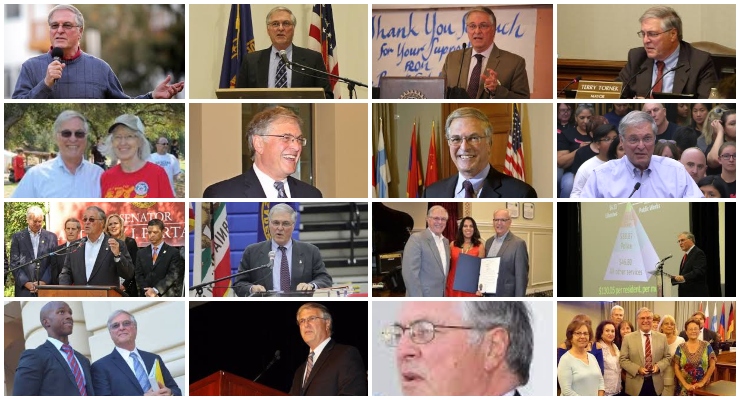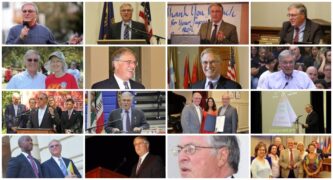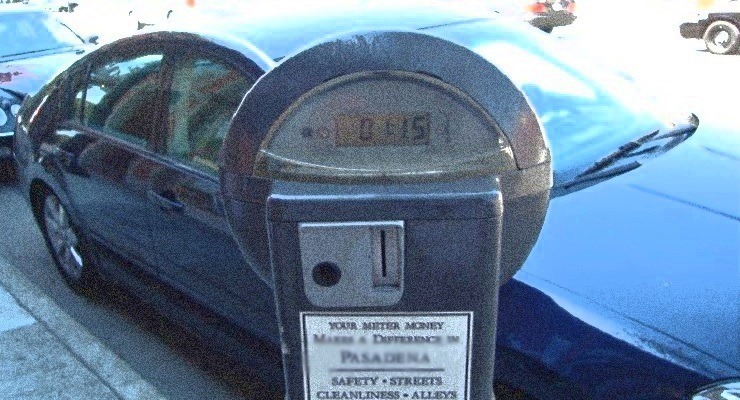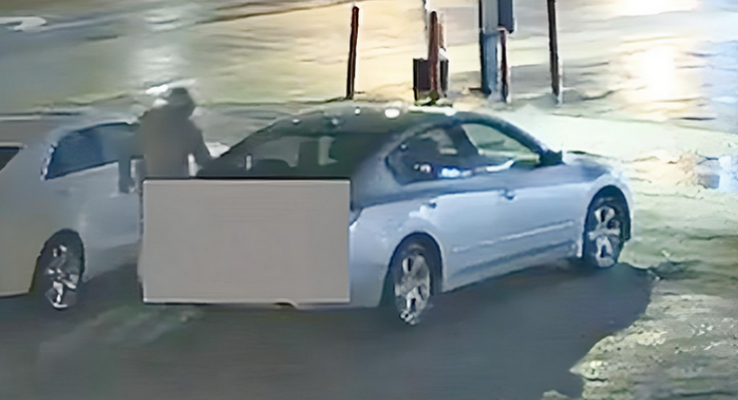
This article is the second in a series focusing on the 2020 Pasadena mayoral race. “Insiders and Outsiders: A Closer Look at the 2020 Candidates for Pasadena Mayor” is written by Pasadena resident and writer, Doug Forbes.
[Updated] As he exited City Hall in April of 2015, Terry Tornek said, “I wouldn’t have done a single thing differently.” Tornek had just concluded months of door-to-door campaigning for Pasadena mayor. It paid off. He said he owed his success to a simple, traditional retail politics model—reach people where they live, explain your agenda and ask for votes.
More than four years later, Tornek said facing challenges head-on is nothing new. He and his older brother were raised by their parents in a rent-controlled apartment on Ocean Parkway in Brooklyn, New York, near Prospect Park. He attended a Jewish parochial school before entering Erasmus Hall High School on Flatbush Avenue.
He said 8,000 students attended Erasmus, some of whom would become Nobel laureates and renowned entertainers such as Barbra Streisand and Neil Diamond. Despite the odds, he became class president. A young woman named Maria became treasurer. And more than 52 years later, they remain together, as husband and wife. “It was love at first sight for me, but not necessarily for her.”
Tornek also fell in love with public policy at the Woodrow Wilson School for Public and International Affairs at Princeton University where the school motto was: “Princeton in the nation’s service.” After graduating and marrying Maria at age 21, he said he postponed a strong desire to work in government in order to put Princeton’s service motto to work for one year as an active duty National Guardsman in the Special Forces Group (Airborne).
Tornek said he served as a Guard reservist for another five years but scored a job as an urban renewal representative for the Department of Housing and Urban Development in New York. He said he soon realized he was out of his depth. “I decided I did not have enough skills and training, so I went to Columbia’s school of architecture for a planning degree.” Maria supported the couple as a bilingual teacher on the Lower East Side.
Tornek said his thesis at Columbia posited that a city with the most livable scale and least enmity and social detachment landed between 150,000-300,000 residents. “Otherwise, when they get too big, they cannot perform and connect to the people.” In line with that theory, he and Maria moved to Springfield, Massachusetts—slightly more populous than Pasadena—where Tornek assumed the post of Planning Director in his early 30’s and where the couple remained for a decade.
“I was fascinated with cities,” he said. “I grew up in a big city. And my father was a watch importer who represented factories in Switzerland. So, I got to travel with him. I was always a student of cities.” In Springfield, Tornek put those studies into action, when he became the first administrator of the regional transit authority comprised of 16 cities.
Job flexibility coupled with an emerging public profile enabled him to successfully run for city council. He served for one term. Tornek said he wanted to run for mayor, but Maria said no. They had three young children at the time. She said that “it would not be conducive to family life.”
But children did not stop the couple from eventually packing up and moving to Pasadena in 1982 where Tornek was hired as Pasadena’s planning director. He was charged with the transformation of a historic yet downtrodden Old Pasadena district. He said that Pasadena Heritage and the preservationists had just “beaten city hall’s plan to scrape Old Pasadena.” Officials sought someone who could bridge the divide. The timing was right for him to step in.
Old Pasadena was a blighted area rife with “bars and hookers, tattoo parlors and empty buildings,” he said. Developers were interested, but safety, parking and infrastructure obstacles were non-starters. Tornek said his vision was to both maximize incipient developer interest and generate greatly needed revenue for redevelopment.
He invented a “parking credit” system by which such developers would buy into parking garages that the city had not yet built. That revenue combined with redevelopment tax incentives forged a path toward the Old Pasadena of today.
Tornek said he “burned out” after only three years. He transitioned to the private development sector thereafter. “The first project I did was back in Old Pasadena. I put my money where my mouth was.” He developed the turn-of-the-century Dodsworth Building at the corner of Fair Oaks and Colorado where the Cheesecake Factory currently resides. He also helped manage a $380 million portfolio for former Japanese developer Haseko California, Inc.
Tornek said he eventually got bitten by the same political bug that bit him back east. He was subsequently elected to city council in 2009, representing the 7th District for two terms, before beating Jacque Robinson-Baisley in a 2015 mayoral run-off.
Tornek said what drew him to Pasadena politics was the feeling he got when he canvassed neighborhoods—a palpable pride and engagement that pervaded the city. “Since becoming mayor, the thing I’ve really gained a keener appreciation of is the role that voluntarism has played… 1,100 nonprofits, and I feel like I’ve been at all their fundraisers. You name the issue, we have multiple organizations that are dedicated to helping their neighbors.”
Tornek said that this sense of community correlated with his Columbia thesis which argued how cities roughly the size of Pasadena afforded a pride of ownership. He said, “The lecture I got from my father involved the three-legged stool of work, family and voluntarism. If you have that, you live a happy life, and he was right.”
What he is not happy about, however, is the current tenor of local politics. “We have a very engaged citizenry, but there is an overlay of anger. I don’t know if it is attributable to the tone of the country, but people are quicker to mistrust government, which is troublesome. It gets in the way of the thoughtful discussions.”
He said that people are fearful of change. As a result, housing, homelessness, increased density, traffic and the changing face of the city have fostered flashpoints. “Ironically, people do not connect the dots.”
His priorities are to connect the dots to infrastructure—such as replacing fire stations, repaving more streets and fixing lights—and also the political will to sock money away to meet an unfunded pension liability. “It’s all of the really unsexy, expensive stuff that nobody wants to discuss.” He said having split his career between public and private sectors, he understands how to sign the back and the front of a check for smart growth.
Tornek said he also understands the aspirations of Pasadenans after countless hours walking neighborhoods, knocking on doors, conversing with constituents in the vein of old school retail politics. “I don’t just listen. I am not capable of passive listening. I am an advocate. Maybe that’s bad, but the best experience for me is not just listening but engaging.”
On one hand, he said, citizens express concerns over homelessness and affordable housing. On the other, they object to increasing density and changing the face of the city.
Tornek faced mounting concerns over the 710 freeway extension, but the deal died in 2018. “We finally put the 710 away. In part that happened because I changed strategies, going directly after Metro” he said. In 2018, the Los Angeles County Metropolitan Transportation Authority unanimously voted against the tunnel extension for lack of logistical and economic feasibility.
In 2015, however, Tornek had actually voted in favor of the tunnel in order to honor, he said, the majority of Pasadenans who voted for its construction 13 years earlier. He said, “To say the vote of the people doesn’t count? I’m not going to take that on,” He asked for another ballot to recast the public vote, which the council rejected.
Having been accused by other council members of favoring developers over residents, he said, “We spent five years and had thousands of people participating in the development of the General Plan—what the city should look like over the next 20 years. The core aspect of that plan was to protect the neighborhoods, maintain the general density, while at the same time allowing for some new development so we can pay for things. That strategy has been working. The problem is this continual intervention of NIMBYism which precludes the production of housing.”
He said he is pleased that the council recently augmented the percentage of affordable housing units in the Inclusionary Housing Ordinance and it was not effective to “simply pull up the drawbridge” on further growth. “We’ve averaged only about one percent per year. It’s not a tsunami of growth happening here.”
The effects of growth on homelessness, however, remains a debatable issue. “The reason our homeless population is going down while the region’s is escalating is because we can mobilize resources,” he said. Tornek was elected mayor in 2015. According to the Pasadena Partnership point-in-time count, homelessness had decreased 48 percent since 2011. By 2016, it decreased another eight percent. Two years later, the number of homeless increased by 28 percent. According to Tornek’s website, homelessness “dropped 20%.” But during his 4-year tenure, the homeless rate fell by 14 percent.
Another number that has fallen during his term is the number of public school students and schools themselves. Tornek said, “I feel that, with my focus on public education, I can make a difference in the quality of education being delivered to kids in Pasadena. And we’ve proved it. We got a sales tax.” That increased sales tax came by way of voter-supported Measures I and J from which a percentage of revenue is earmarked for PUSD.
Despite the tax revenue now being filtered to the district, Pasadena recently decided to close three public schools – Franklin, Jefferson and Roosevelt—in addition to having closed Cleveland Elementary. Middle schools and high schools are also squarely on the chopping block. School board member Kimberly Kenne recently said it’s only a matter of time before more schools close.
PUSD enrollment has declined by approximately 2,500 students since 2012. Of all current PUSD-eligible students, only 55 percent attend district schools, while 45 percent opt for one of more than 50 local private institutions, a nonattendance ratio three times the national average.
Tornek has had his share of challenges. He has also juggled hopefulness and skepticism since the day he was elected in 2015. Former mayor Bill Bogaard had just concluded the longest mayoral term in city history. Tornek exited city hall after his election and said, “Pasadena used to be an example for the region—a model city. We need to get back to that.”
Bogaard and Councilmember Victor Gordo have offered their own assessments of Pasadena under Tornek. Bogaard not only endorsed Gordo for mayor but also serves as his campaign co-chair and treasurer. Gordo recently said, “Too many Pasadenans believe they are unheard at the top of City Hall.”
In response, Tornek said, “I think that’s a handy talking point. I concede nothing to anyone in terms of consensus-building. I am absolutely accessible. I go to virtually every community event. I think what happens is sometimes when people don’t like an outcome, they blame the process. The notion that somehow I’m not listening is absurd. One thing that is absolutely clear is that I let people know where I stand.”
Tornek said he was confident that, with 2020 local elections now coinciding with state and national voting, there will be a much larger turnout of voters who “never cared about local issues before.”
Pasadenans are considering those issues as the 2020 race heats up.
Next week, mayoral candidate Victor Gordo weighs in on his assessment of the last four years and the next.














 3 comments
3 comments


